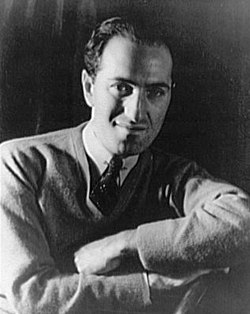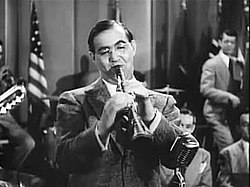
| Jazz standards and tunes |
|---|
| Before 1920 |
| 1920s |
| 1930s |
| 1940s |
| 1950s and later |
| A–Z of jazz standards and tunes |
Jazz standards are musical compositions that are widely known, performed and recorded by jazz artists as part of the genre's musical repertoire. This list includes compositions written in the 1930s that are considered standards by at least one major fake book publication or reference work. Some of the tunes listed were already well known standards by the 1940s, while others were popularized later. Where appropriate, the years when the most influential recordings of a song were made are indicated in the list.
Contents
Broadway theatre contributed some of the most popular standards of the 1930s, including George and Ira Gershwin's "Summertime" (1935), Richard Rodgers and Lorenz Hart's "My Funny Valentine" (1937) and Jerome Kern and Oscar Hammerstein II's "All the Things You Are" (1939). These songs still rank among the most recorded standards. [1] Johnny Green's "Body and Soul" was used in a Broadway show and became a hit after Coleman Hawkins's 1939 recording. It is the most recorded jazz standard of all time. [2]
In the 1930s, swing jazz emerged as a dominant form in American music. Duke Ellington and his band members composed numerous swing era hits that have become standards: "It Don't Mean a Thing (If It Ain't Got That Swing)" (1932), "Sophisticated Lady" (1933) and "Caravan" (1936), among others. Other influential bandleaders of this period were Benny Goodman, Louis Armstrong, Cab Calloway and Fletcher Henderson. Goodman's band became well known from the radio show Let's Dance and in 1937 introduced a number of jazz standards to a wide audience in the first jazz concert performed in Carnegie Hall. [3]





